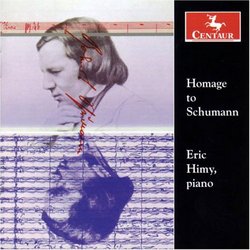VISIONARY SCHUMANN /BBC Music Magazine- Himy/Schumann / CD o
BERGMANN | NY | 12/23/2007
(5 out of 5 stars)
"BBC Music Magazine- Himy/Schumann / CD of the Month / December 2007
*** BBC MUSIC CHOICE ***
VISIONARY SCHUMANN
Michael Tanner applauds Eric Himy's serious approach
We are told that this is the first CD recording of the new Steingraebber Phoenix Pianos. Without understanding the significance of this, I must say the sheer sound of Eric Himy's playing here immediately casts a spell.
The sound is of extaordinary richness but also of refinement, and suits Himy's playing of Schumann to a T. He writes eloquently in his extensive notes, and it is clear anyway from his playing that it is Schumann the visionary alternating with the man of action that he goes for, rather than
Schumann the mischievous elfin composer beloved of many pianists. The "Chopin" item, for instance, is played with almost devout imitation, rather than the hint of mockery its marking implies. Himy can be a bit too weighty for the music's good, sounding more like early Brahms. But there is a cummulative tension in his playing, a warmth and strength of feeling combined with all the necessary technique which makes this the most appealing new Schumann disc I have heard for a very long time.
PERFOMANCE *****
SOUND *****"
Rapturously Emotional SCHUMANN
MG | 06/10/2007
(5 out of 5 stars)
""With Schumann's Symphonic Etudes, Himy revealed his true talents: a prodigious muscular power and emotional forcefulness. Under Himy's hands, the variations were rapturously emotional, a veritable tidal wave of successive and rapidly altering emotions. The listener, knowing that by 1840 Schumann was displaying obvious signs of the mental instability that would require him to spend the final years of his life under institutional care, sensed a noble mind already being wrenched apart by competing emotions."
Stephen Neal Dennis"
American Record Guide June 2007 -"Marvelous"
VLADIMIR CORTOT | 06/10/2007
(5 out of 5 stars)
"At about half an hour of music, Carnaval (1834-35) is one of the largest of Schumann's many collections of short pieces, designed to be performed as a complete work. It is also probably one of the most important collections of piano music from the romantic era. Liszt performed ten sections in 1840 and probably was the first to perform it in its entirety. Rachmaninoff was the first to record it, in 1929, and that recording is legendary (RCA 61265). This work has been performed and recorded by the greatest pianists. Although their standards may have been extremely high, they have only inspired countless pianists in future generations to study, analyze, learn, perform, and record this most fascinating composition.
While traditional musical analysis of melody, harmony, and form may be made on Carnaval, the extra-musical elements carry probably more weight towards a complete understanding of the work. I am indebted to Eric Himy's marvelous notes for giving me a much deeper understanding of Carnaval. And his performance is on a par with his notes. I appreciate his ability to make each section come alive on its own terms, while still seeing the big picture. He includes the 'Sphinxes' movement and plays it much like Rachmaninoff: doubling the cryptic single bass notes an octave lower and using a dynamically shaped tremolo to create a rather ominous sound.
Himy's generous disc also has fine performances of the Arabeske and Symphonic Etudes. He includes all posthumous variations arranged among the main set in the order suggested by Cortot. The piano sound is very good (a first recording with a Steingraeber & Sohne Phoenix Piano).
HARRINGTON
"


 Track Listings (44) - Disc #1
Track Listings (44) - Disc #1